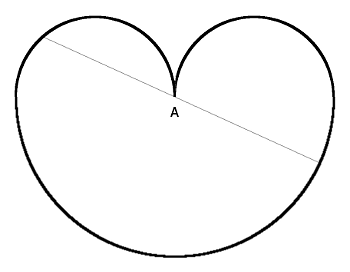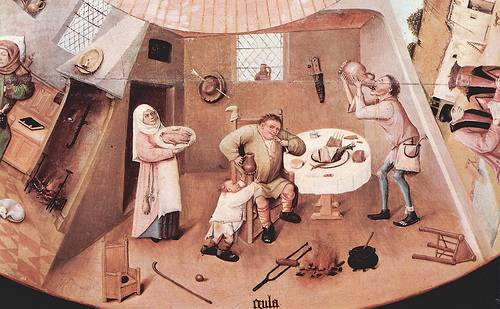
Suppose we fill Yankee Stadium with 50,000 people and ask them to spend the day shaking hands with one another.
Prove that, at the end of the day, at least two participants will have shaken hands with the same number of people.

Suppose we fill Yankee Stadium with 50,000 people and ask them to spend the day shaking hands with one another.
Prove that, at the end of the day, at least two participants will have shaken hands with the same number of people.
When the San Diego Wild Animal Park opened in 1972, it featured a monorail that visitors could ride around the park’s perimeter. The railway was called the Wgasa Bush Line, a suitably exotic name that many visitors assumed was African.
In fact the name arose in a planning meeting. When chief designer Chuck Faust couldn’t think of a name, he wrote WGASA on the plans. “Everybody laughed because they knew what it stood for, but they loved it because it sounded African,” zoo founder Charles Schroeder wrote later. “We thought WGASA would blow over, but it actually stuck.”
It stands for “Who gives a shit anyway?”
One of the magistrates in Harbour Grace, in Newfoundland, had an old dog of the regular web-footed species peculiar to this island, who was in the habit of carrying a lantern before his master at night, as steadily as the most attentive servant could do, stopping short when his master made a stop, and proceeding when he saw him disposed to follow. If his master was absent from home, on the lantern being fixed to his mouth, and the command given, ‘Go fetch thy master,’ he would immediately set off, and proceed directly to the town, which lay at the distance of more than a mile from the place of his master’s residence: he would then stop at the door of every house which he knew his master was in the habit of frequenting, and laying down his lantern, growl and strike the door, making all the noise in his power until it was opened; if his master was not there, he would proceed farther in the same manner, until he had found him. If he had accompanied him only once into a house, this was sufficient to induce him to take that house in his round.
— The Scrap Book, Or, A Selection of Interesting and Authentic Anecdotes, 1825

Draw a semicircle and surmount it with two smaller semicircles.
A line drawn through A, at any angle, will divide the perimeter precisely in half.
This probably has some romantic symbolism, but I’m not very good at that stuff.
06/19/2024 Very belated update: This is called the cardioid of Boscovich, after Roger Boscovich, 1711-1787. There’s a proof of the theorem in Alsina and Nelsen, Icons of Mathematics.

Buzz Aldrin celebrated communion on the moon. From his 2009 book Magnificent Desolation:
So, during those first hours on the moon, before the planned eating and rest periods, I reached into my personal preference kit and pulled out the communion elements along with a three-by-five card on which I had written the words of Jesus: ‘I am the vine, you are the branches. Whoever remains in me, and I in him, will bear much fruit; for you can do nothing without me.’ I poured a thimbleful of wine from a sealed plastic container into a small chalice, and waited for the wine to settle down as it swirled in the one-sixth Earth gravity of the moon. My comments to the world were inclusive: ‘I would like to request a few moments of silence … and to invite each person listening in, wherever and whomever they may be, to pause for a moment and contemplate the events of the past few hours, and to give thanks in his or her own way.’ I silently read the Bible passage as I partook of the wafer and the wine, and offered a private prayer for the task at hand and the opportunity I had been given.
“Perhaps, if I had it to do over again, I would not choose to celebrate communion,” he wrote. “Although it was a deeply meaningful experience for me, it was a Christian sacrament, and we had come to the moon in the name of all mankind — be they Christians, Jews, Muslims, animists, agnostics, or atheists. But at the time I could think of no better way to acknowledge the enormity of the Apollo 11 experience that by giving thanks to God.”
John Raymond Godley (1920-2006), Lord Kilbracken, was a respected writer and journalist, but he’s remembered mostly for a peculiar talent: He dreamed the winners of horse races.
And so on. He couldn’t summon the dreams, of course, and the horses he picked didn’t invariably win. But even nine years later a dream led him to the winner of the Grand National. “I can offer no explanation, rational or irrational,” he wrote in a memoir. “Make your own deductions, but accept my facts as true.”
[In 1816] the interest in Napoleon and St. Helena was strong. A small paragraph in a local Chester paper told the inhabitants of that ancient and usually somnolent city that the British government desired to rid St. Helena of the rats and the mice which were understood to be leading the exiled emperor ‘such a life.’ Accordingly, said the paragraph, the government was offering large sums for cats–sixteen shillings for well grown males, ten for females, and half a crown for kittens. It was requested that all who desired to help in the good work by disposing of their pets at these prices should appear at a given hour at a given address.
At the time and place, an army of about three thousand generous and patriotic souls presented itself at the house designated. There were cats in baskets, cats in boxes, cats squirming restlessly in the warm clutch of children. The house was empty, and a little investigation soon proved that it had been unoccupied for a long time. Next morning more than five hundred cats were found drowned in the waters of the Dee; so that this hoax was not without its element of tragedy, and brutal tragedy at that.
— William S. Bridgman, “Famous Hoaxes,” Munsey’s Magazine, August 1903

smellfeast
n. “one who is quick at finding and frequenting good tables”; a parasite
